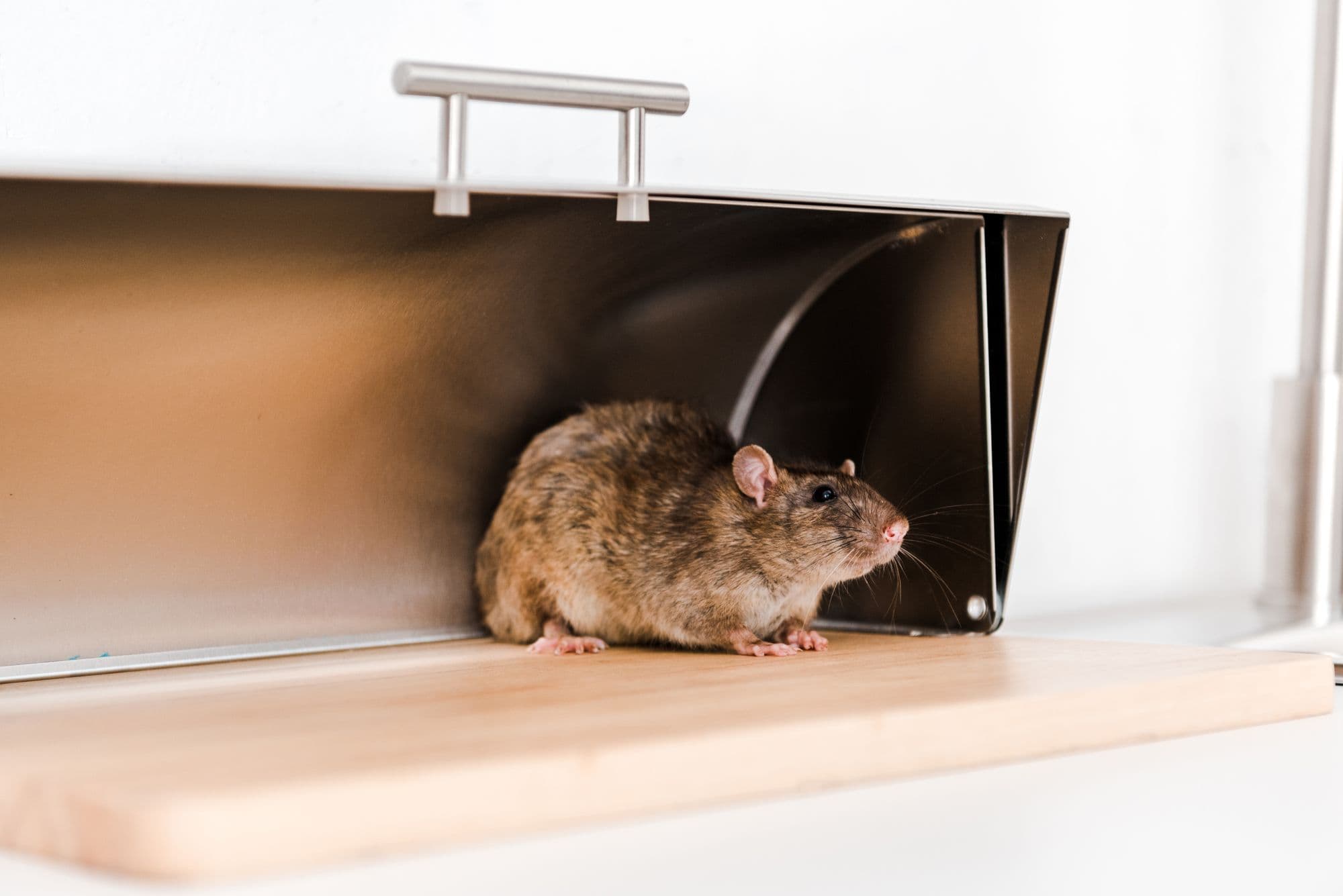A Spic and Span Strategy
10/12/2023

Overview
Uncover the essentials of rodent prevention through sanitation. From food storage to decluttering, learn how cleanliness keeps your home rodent-free.
In the preceding segment of our series, we emphasized the indispensable role of inspections in the world of rodent exclusion. Now, as we forge ahead into the fifth article of "The Ultimate Guide to Rodent Exclusion", it's paramount to comprehend the undeniable connection between impeccable sanitation and an effective rodent control strategy.
Rodent issues are not exclusive to unkempt spaces. Even the most immaculate homes can become a haven for these creatures if the right sanitation measures aren’t employed. Here, we'll demystify the intricate relationship between cleanliness and rodent control.
Types of Sanitation Affecting Rodent Behavior
Food Storage
- The search for sustenance is a primary driver of rodent behavior. They have a keen sense of smell and can detect even trace amounts of food from a considerable distance.
- Vulnerable Food Sources:
- Pantry Staples: Items such as rice, grains, nuts, and even boxed cereals can be an open invitation if not stored or sealed correctly.
- Fruits and Vegetables: Leaving fruits and vegetables on countertops or in places where they are easily accessible can be a mistake. The natural sugars in them can be quite tempting for rodents.
- Leftovers: Even the smallest leftover can attract rodents. They aren’t picky and will gladly feast on what we might consider scraps!
- Recommendation:
- Regularly inspect and rotate pantry goods.
- Use glass or heavy-duty plastic containers for storage.
- Regularly clean storage areas to ensure no spilled food is left behind.
Waste Management
- Rodents aren’t discerning diners. Given the choice, they'll happily scavenge in trash for their next meal.
- The Allure of Garbage:
- Odor Trails: Rotting organic waste emits odors that can attract rodents.
- Access Points: If garbage bags aren't sealed properly or bins don’t shut tightly, they can easily become feeding grounds.
- Recycling: Often overlooked, but leftover residue in items like cans or bottles can be enticing.
- Recommendation:
- Ensure trash bags are securely tied and bins are tightly shut.
- Clean bins regularly to avoid lingering odors.
- Rinse out bottles, cans, and other recyclables before placing them in recycling bins.
Clutter Control
- Beyond just being an eyesore, clutter creates a complex environment replete with hiding places, nesting material, and often overlooked food sources.
- Hiding Spots:
- Piles: Stacks of magazines, newspapers, or even clothes can offer shelter and nesting material.
- Boxes: Cardboard boxes, especially if stored in damp places, can provide both food and shelter. The glue in cardboard is often starch-based, which can be a food source.
- Seldom-Used Equipment: Old machinery, appliances, or even stored items in a garage can offer dark, undisturbed hideouts.
- Recommendation:
- Adopt a minimalistic approach where possible.
- Store items in plastic containers rather than cardboard.
- Regularly inspect, clean, and rotate stored items, especially in attics, basements, and garages.
By understanding these intricacies of rodent behavior in relation to sanitation, homeowners can be better equipped to create an environment that’s less inviting to these pests. Proper sanitation doesn’t just deter rodents; it sets the stage for a cleaner, healthier living space.
Guidelines for Effective Sanitation
Effective sanitation is the cornerstone of creating an environment that's uninviting to rodents. It goes beyond mere cleaning to include proactive and preventive measures that ensure a home is not just clean, but also rodent-resistant.
Food Storage Tips:
- Airtight Containers: Not all containers are created equal. Look for those with tightly sealing lids that can prevent both the ingress of rodents and the egress of tempting aromas.
- Recommendation: Opt for glass or thick, sturdy plastic containers. Also, label and date items so that you can use and rotate them systematically.
Pet Food Vigilance:
- Pets are family, and their food is as attractive to rodents as ours.
- Recommendation: Don’t leave pet food out overnight. If you buy in bulk, transfer portions to a metal bin with a tight lid, as rodents can’t gnaw through metal.
- Immediate Cleanup: In the world of rodents, even a minor spillage can represent a bounteous feast.
- Recommendation: Clean up spills immediately, sweep or vacuum daily, and mop regularly. A cleaning routine decreases the chances of overlooked food sources.
Proper Disposal Techniques
- Trash Protocol: Proper disposal isn't just about getting rid of waste but doing it in a manner that doesn't attract pests.
- Recommendation: Double-bag waste, especially food remnants. Securely tie bags and ensure they're placed in a bin with a tightly sealing lid.
- Routine Trash Disposal: Letting garbage pile up is an open invitation for rodents.
- Recommendation: Have designated days for taking out the trash. If you compost, ensure your composting system is sealed and regularly turned.
- Composting: This eco-friendly practice is commendable, but without proper care, it can attract rodents.
- Recommendation: Use sealed composters, turn the pile regularly, and avoid adding meat or dairy to the compost to reduce rodent attraction.
De-cluttering and Organization
- Embrace Minimalism: A clutter-free home is less inviting to rodents, mainly because it offers fewer hiding spots.
- Recommendation: Regularly assess your possessions. Donate, sell, or responsibly dispose of items you no longer need.
- Stored Items: Periodically inspecting stored items can prevent unnoticed infestations.
- Recommendation: Opt for clear plastic containers for storage. They not only deter rodents but also allow you to see the contents easily, making inspections quicker.
- Useful Tools for Organization: Having the right tools can make the process of decluttering and organizing more efficient.
- Recommendation: Consider shelving units, storage bins, and labeling systems. Organized spaces are not only less attractive to rodents but also create a more pleasant living environment for residents.
By implementing these guidelines, homeowners can elevate their sanitation game, effectively reducing the chances of rodent infestations. Adopting these practices ensures that a home isn't just clean on the surface, but is systematically uninviting to potential rodent invaders.
Empire Lawn & Pest Control’s Integrated Sanitation Protocols
When tackling rodent issues, a holistic strategy that incorporates sanitation is paramount. It's not just about removal but also prevention. Our technicians undergo rigorous training to understand the symbiotic relationship between cleanliness and effective rodent control, ensuring they provide actionable advice to homeowners.
The Broader Impact of Sanitation
Sanitation is a linchpin not only for rodent control but also for holistic home health. A clean environment wards off a plethora of pests, reduces allergens, and, most importantly, provides mental solace knowing you're in a space free of uninvited guests.
While our journey through sanitation's role in rodent exclusion draws to a close, it's pivotal to remember that the fight against these pests is ongoing. Armed with the right knowledge and habits, homeowners can fortify their homes against these unwanted guests. As we venture into our next segment, we’ll delve into long-term strategies and their paramount importance. Stick with us as we navigate these waters, ensuring a rodent-free existence.
Frequently Asked Questions (FAQs)
How often should I clean and sanitize my home to deter rodents?
While daily cleanliness is essential, a thorough deep cleaning and sanitation of potential problem areas (like pantries, basements, and garages) should be done at least once a month. It's also crucial to clean up food spills immediately and ensure that waste is disposed of properly.
Are certain foods more attractive to rodents than others?
Rodents are attracted to a variety of foods, but they particularly love grains, nuts, fruits, vegetables, and leftovers. Foods with strong odors or high sugar content can be especially enticing. Proper storage is key to deter them.
How do I know if my compost is attracting rodents?
Signs like gnawed fruits/vegetables, burrowing holes near the compost, or seeing rodents during the day can indicate attraction. Always use a sealed composter and avoid adding meat or dairy to reduce appeal.
Do store-bought rodent repellents work?
While some store-bought repellents can provide temporary relief, they are not a long-term solution. It's essential to address the root cause, which often relates to sanitation and entry points in the home.
Can a single missed food item attract rodents?
Yes. Rodents have an acute sense of smell and can be drawn to even trace amounts of food. This underscores the importance of meticulous sanitation.
